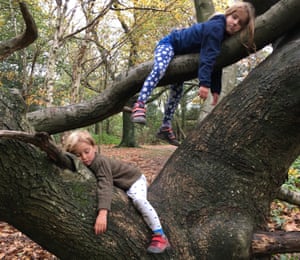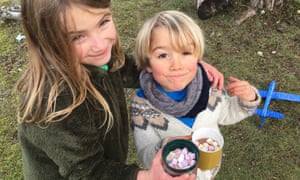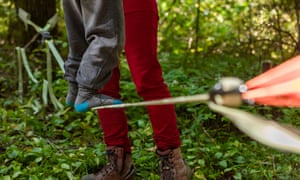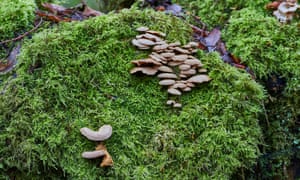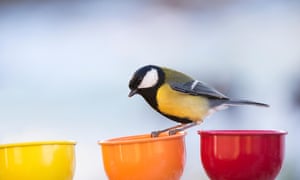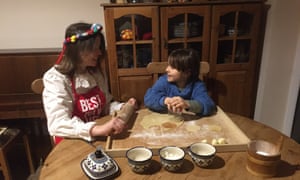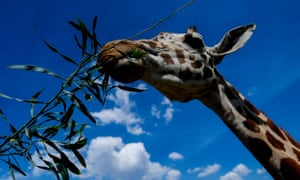Embrace global festivals and culture
Christmas, Easter, Bonfire Night and Halloween – the events that usually punctuate our year – haven’t felt sufficient in the pandemic, so in my family we’ve gone all out for occasions that would usually pass us by. Cultural appropriation maybe, but it has livened up Groundhog Day dinner times. We had a Diwali party in November, taking advice from an Indian friend on how to do it right, and cooked pakoras, wore new(ish) clothes, played games and covered the kitchen with fairy lights. For Burns Night my four-year-old helped make frozen cranachan, we ate haggis, played a bagpipe Spotify playlist and recited poems, including a welcome address penned by my seven-year-old, whose lines included: “I don’t know why but my dad is wearing a skirt …” (In lieu of a kilt, a peach silk number had to suffice.)
Next up are Chinese New Year on 12 February (cue paper lantern-making, dumplings and fireworks), Valentine’s Day on the 14th (an excuse to make cards and candles) and Pancake Day on the 16th. February in normal times means mardi gras carnivals in Europe, New Orleans and most of all Brazil, and the Sapporo snow festival Japan. These are great excuses to make costumes, artwork and traditional food, and dance to appropriate music.
Nearer home there’s National Chip Week (20-26 February), a chance to get creative with veg and potato varieties and toppings. Or invent your own festival. In January we created what will now be an annual, hallway-based celebration of finally putting the coat rack up after four years on the to-do list.
Games for walks
Taking young children on walks inevitably involves some whingeing, but we’ve recently managed to increase our four-year-old’s tolerated walking time from two hours to three or four by upping our props and picnic game (see below).
Playing is also crucial: our four- and seven-year-old now have several favourite games.
Guess the animal (with yes and no answers to questions) can turn into an equivalent based on their latest interests. We’ve done guess the species of dragon from How To Train Your Dragon, though you have to know your Monstrous Nightmares from your Basic Browns. Spies involves the children secretly following us while remaining hidden: they dart from tree to tree, ducking when we turn to survey the scene. For Pirates, fallen trees make good ships, especially if they’re on a small island in a stream.
In Bad Dad, dad is a criminal trying to escape: he runs off and we give chase, yelling “Don’t let him get away!” and throwing pine cones at him. For Sloths, the children hang upside down from tree-branches being sloths and I am a hunter/conservationist coming to steal/help them. Motorbikes means running up and down steep-sided halfpipe-like paths and ditches pretending to be motorbikes, making higher-pitched revving noises when going uphill. (Yes, you have to not care about looking like a plonker if you encounter fellow walkers.)
If these pall, enlist professional help. Treasure Map Trails (£5.99 or £8.99 for two) makes unusual illustrated maps of 17 English towns with quirky features to spot. Treasure Trails (no connection) produces downloadable, themed walk booklets (£9.99) involving treasure hunts, puzzles and clues to solve on 1,200 routes across the UK.
Picnics, but better
If there is still some debate over whether sustenance is allowed on our allotted daily walks, I’d be willing to argue in court that kids need snacks when being made to put one foot in front of the other. We now take three flasks on our family expeditions: hot chocolate for the kids (with mini marshmallows), a larger one of coffee, and one of hot food – typically macaroni cheese for us, but friends recommend frankfurters in hot water for picnic hotdogs.
It’s made a massive difference and it’s much easier to persuade them out on a “hot chocolate adventure” than a walk. Our country outings have been made even more enjoyable thanks to our mini raclette set (£20), a simple fold-up grill heated by tea lights. We melt cheese for crackers and sandwich crusts, wipe it clean, then melt chocolate for dipping apple slices and sometimes more of those marshmallows, which the eldest whittles sticks for.
Switch up your outdoor kit
A trip to the park you’ve visited every day can be made to seem exciting with a bit of new kit. We’ve invested in a slackline (from about £33), Stomp Rockets (from £12) and walkie-talkies. I now have my eye on some Ninja tree-climbers (£25) – rock-climbing holds that strap to tree trunks. On walks we always carry a couple of large carabiners, a climbing rope and a sling (basically a sewn loop of strong webbing, £4 from Decathlon) to hook over branches for swings, to help with muddy descents or to loop round the kids and pull them along when they’re tired. We sometimes add a long stick to make a kind of T-bar lift for two – gets the job done when mutiny is threatened.
Nature walks and crafts
Spotting mushrooms, collecting pine cones, getting your bearings from moss – it usually grows on the north side of trees – and following animal tracks all add interest to a walk. Hundreds of blogs and books give ideas: getoutwiththekids.co.uk suggests a game where a blindfolded person is led to a tree to feel, moved away, then asked to guess which tree it was when the blindfold is removed.
We love Lonely Planet’s magical Wild Things book: it’s full of nature craft ideas, from creating fairy outfits from leaves and flowers to building a potion lab from bits founds in the garden or park, and turning logs into dragons. The National Trust’s Go Wild series of books has activities suited to different types of landscapes, and Born To Be Wild, by Hattie Garlick, arranges its hundreds of things-to-do suggestions by season.
Embrace the dark
One of the few advantages this lockdown has over last spring’s is the chance for children to be out in the dark without staying up past bedtime. Just going down to the end of our narrow urban garden on winter nights has felt adventurous, and wandering local streets or the park at dusk with a torch or camping lantern is a very different experience from a daytime ramble, with different wildlife to spot.
A few obvious constellations and some space science for stargazing can soon be learned from stargazing apps, websites and books such as National Geographic’s childrens’ space hub, and skymaps.com, which has monthly printable maps of the night sky. Older kids can study astronomy and astrophotography through online events at the upcoming Northumberland Dark Skies festival (12-21 February).
Holiday vibes at home
The thing I’ve missed most about travelling is the change of atmosphere. At home we’ve summoned a Scandi holiday vibe by sitting around a campfire on sheepskins and blankets with hot chocolate and gløgg, making up Viking stories. And we’ve spent some delightful candlelit bath times listening to a global folk tales podcast, Journey With Story by Kathleen Pelley.
Another fun way to “travel” is to cook food from a different country each week, maybe Ghanaian jollof rice, Mexican tamales, or Hawaiian bacon-wrapped waterchestnuts, learning about its culture as you go.
Camping in the garden, if you’re lucky enough to have one, is super exciting, but if February is too cold, set up a den camp in the living room and sleep there, eating camp food and reading by torchlight. And we’ve found reliving holidays past by looking through photos, remembering and discussing them surprisingly joyful.
Garden birdwatching
Golden orioles may be in short supply but with some printed out spotter sheets and binoculars (even if made from loo rolls), garden or park birdwatching could ignite a passion for birding. Half-term coincides with National Nest Box Week (14-21 February), so paint and hang your own (£4.49 from Primrose), and also with the RSPB’s Big Schools’ Birdwatch, which calls for pupils to submit garden survey results by 22 February.
The RHS is a great source of ideas for getting children involved in gardening activities, even if you don’t have a garden, as is a lovely forthcoming book I helped edit, Little Growers by Ghillie James and Julia Parker (out 4 March, £20) with fun recipes for homegrown produce, such as a gardener’s cake decorated with flowers.
Online learning (that isn’t phonics)
After six weeks of homeschooling I’m reluctant to suggest more internet, but there are some brilliant travel-related experiences for a break from phonics and maths.
Adventure tour operator Intrepid is offering live interactive classes taught by local tour guides and their families, whom you can chat to about their lives and culture. Classes include making Poland’s national dish of pierogi with a family in Krakow (two hours, £21 per family), and Frida Kahlo-inspired watercolour painting with a Mexico City-based artist (one hour, £22 per family). Similarly, Tours By Locals has a live class cooking Russian cream cheese pancakes from a dacha (country house) near Moscow (one hour, £64 for up to 10, link can be shared with another family). Closer to home, lovely Eastnor Pottery has some fun free clay modelling tutorials.
Tweens and teens might like an online e-learning Padi beginners’ open water diving course for over-10s (£155pp): participants have a year to complete the online section and can finish the in-water training at a Padi Dive Centre at any time.
Virtual travel
Almost every attraction or destination has created virtual tour content over the past year, so here are a few to start with. Queensland’s Barrier Reef has a new children’s microsite with games including one that involves clicking on as many plastic bags as possible in 30 seconds, while not disturbing the jellyfish. South Africa’s Thanda Safari website has game drive films and staff stories, and children can listen to live bush noises on Singita reserves’ Singita Sounds.
Chester Zoo’s virtual zoo days have amassed 17 million viewers so far, Edinburgh Zoo has live webcams, and lovers of farm animals will like the videos posted by Sacrewell Farm near Peterborough. Glasgow Science Centre posts free films and lessons, and the London Science Museum has some brilliant online games (we love Launchball).
Watch locals’ tours of Siena and Rome on Italy4Real’s website, or book a virtual interactive backpacking getaway on Zoom to destinations including Japan or Swedish Lapland thanks to Oppidan Education’s partnership with tour operator Original Travel (£20 an hour, over-eights).
Source: Read Full Article

